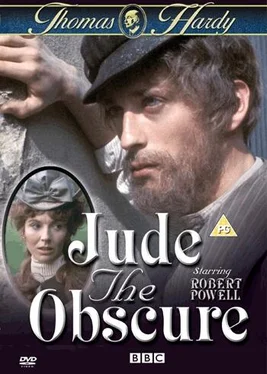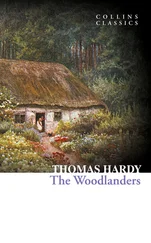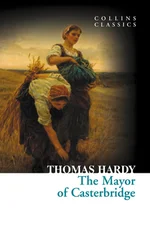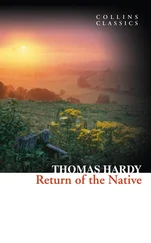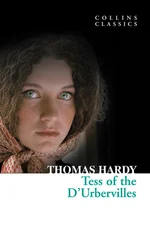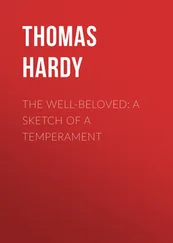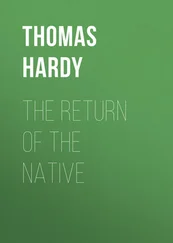"Yea, many there be that have run out of their wits for women, and become servants for their sakes. Many also have perished, have erred, and sinned, for women… O ye men, how can it be but women should be strong, seeing they do thus?"
Esdras
The schoolmaster was leaving the village, and everybody seemed sorry. The miller at Cresscombe lent him the small white tilted cart and horse to carry his goods to the city of his destination, about twenty miles off, such a vehicle proving of quite sufficient size for the departing teacher's effects. For the schoolhouse had been partly furnished by the managers, and the only cumbersome article possessed by the master, in addition to the packing-case of books, was a cottage piano that he had bought at an auction during the year in which he thought of learning instrumental music. But the enthusiasm having waned he had never acquired any skill in playing, and the purchased article had been a perpetual trouble to him ever since in moving house.
The rector had gone away for the day, being a man who disliked the sight of changes. He did not mean to return till the evening, when the new school-teacher would have arrived and settled in, and everything would be smooth again.
The blacksmith, the farm bailiff, and the schoolmaster himself were standing in perplexed attitudes in the parlour before the instrument. The master had remarked that even if he got it into the cart he should not know what to do with it on his arrival at Christminster, the city he was bound for, since he was only going into temporary lodgings just at first.
A little boy of eleven, who had been thoughtfully assisting in the packing, joined the group of men, and as they rubbed their chins he spoke up, blushing at the sound of his own voice: "Aunt have got a great fuel-house, and it could be put there, perhaps, till you've found a place to settle in, sir."
"A proper good notion," said the blacksmith.
It was decided that a deputation should wait on the boy's aunt—an old maiden resident—and ask her if she would house the piano till Mr. Phillotson should send for it. The smith and the bailiff started to see about the practicability of the suggested shelter, and the boy and the schoolmaster were left standing alone.
"Sorry I am going, Jude?" asked the latter kindly.
Tears rose into the boy's eyes, for he was not among the regular day scholars, who came unromantically close to the schoolmaster's life, but one who had attended the night school only during the present teacher's term of office. The regular scholars, if the truth must be told, stood at the present moment afar off, like certain historic disciples, indisposed to any enthusiastic volunteering of aid.
The boy awkwardly opened the book he held in his hand, which Mr. Phillotson had bestowed on him as a parting gift, and admitted that he was sorry.
"So am I," said Mr. Phillotson.
"Why do you go, sir?" asked the boy.
"Ah—that would be a long story. You wouldn't understand my reasons, Jude. You will, perhaps, when you are older."
"I think I should now, sir."
"Well—don't speak of this everywhere. You know what a university is, and a university degree? It is the necessary hallmark of a man who wants to do anything in teaching. My scheme, or dream, is to be a university graduate, and then to be ordained. By going to live at Christminster, or near it, I shall be at headquarters, so to speak, and if my scheme is practicable at all, I consider that being on the spot will afford me a better chance of carrying it out than I should have elsewhere."
The smith and his companion returned. Old Miss Fawley's fuel-house was dry, and eminently practicable; and she seemed willing to give the instrument standing-room there. It was accordingly left in the school till the evening, when more hands would be available for removing it; and the schoolmaster gave a final glance round.
The boy Jude assisted in loading some small articles, and at nine o'clock Mr. Phillotson mounted beside his box of books and other impedimenta , and bade his friends good-bye.
"I shan't forget you, Jude," he said, smiling, as the cart moved off. "Be a good boy, remember; and be kind to animals and birds, and read all you can. And if ever you come to Christminster remember you hunt me out for old acquaintance' sake."
The cart creaked across the green, and disappeared round the corner by the rectory-house. The boy returned to the draw-well at the edge of the greensward, where he had left his buckets when he went to help his patron and teacher in the loading. There was a quiver in his lip now and after opening the well-cover to begin lowering the bucket he paused and leant with his forehead and arms against the framework, his face wearing the fixity of a thoughtful child's who has felt the pricks of life somewhat before his time. The well into which he was looking was as ancient as the village itself, and from his present position appeared as a long circular perspective ending in a shining disk of quivering water at a distance of a hundred feet down. There was a lining of green moss near the top, and nearer still the hart's-tongue fern.
He said to himself, in the melodramatic tones of a whimsical boy, that the schoolmaster had drawn at that well scores of times on a morning like this, and would never draw there any more. "I've seen him look down into it, when he was tired with his drawing, just as I do now, and when he rested a bit before carrying the buckets home! But he was too clever to bide here any longer—a small sleepy place like this!"
A tear rolled from his eye into the depths of the well. The morning was a little foggy, and the boy's breathing unfurled itself as a thicker fog upon the still and heavy air. His thoughts were interrupted by a sudden outcry:
"Bring on that water, will ye, you idle young harlican!"
It came from an old woman who had emerged from her door towards the garden gate of a green-thatched cottage not far off. The boy quickly waved a signal of assent, drew the water with what was a great effort for one of his stature, landed and emptied the big bucket into his own pair of smaller ones, and pausing a moment for breath, started with them across the patch of clammy greensward whereon the well stood—nearly in the centre of the little village, or rather hamlet of Marygreen.
It was as old-fashioned as it was small, and it rested in the lap of an undulating upland adjoining the North Wessex downs. Old as it was, however, the well-shaft was probably the only relic of the local history that remained absolutely unchanged. Many of the thatched and dormered dwelling-houses had been pulled down of late years, and many trees felled on the green. Above all, the original church, hump-backed, wood-turreted, and quaintly hipped, had been taken down, and either cracked up into heaps of road-metal in the lane, or utilized as pig-sty walls, garden seats, guard-stones to fences, and rockeries in the flower-beds of the neighbourhood. In place of it a tall new building of modern Gothic design, unfamiliar to English eyes, had been erected on a new piece of ground by a certain obliterator of historic records who had run down from London and back in a day. The site whereon so long had stood the ancient temple to the Christian divinities was not even recorded on the green and level grass-plot that had immemorially been the churchyard, the obliterated graves being commemorated by eighteen-penny cast-iron crosses warranted to last five years.
Slender as was Jude Fawley's frame he bore the two brimming house-buckets of water to the cottage without resting. Over the door was a little rectangular piece of blue board, on which was painted in yellow letters, "Drusilla Fawley, Baker." Within the little lead panes of the window—this being one of the few old houses left—were five bottles of sweets, and three buns on a plate of the willow pattern.
Читать дальше
